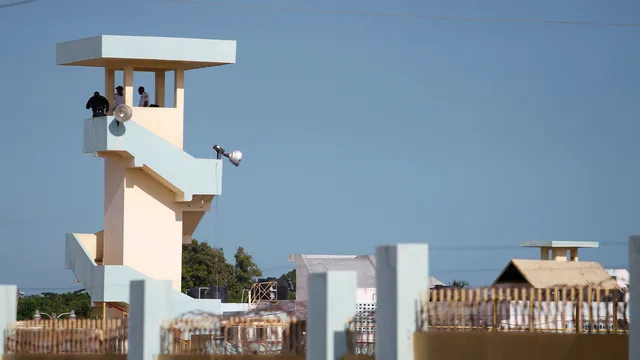
Dominican Republic prisons hold thousands without charges in shocking conditions
2025-02-21 03:10- Over 60% of the Dominican Republic's inmates are held without charges, contributing to serious human rights concerns.
- Inhumane prison conditions lead to calls for reform and accountability from activists and human rights organizations.
- The government plans to build new prisons and overhaul the system to address the ongoing crisis of overcrowding.
Express your sentiment!
Insights
The Dominican Republic is facing a critical situation regarding its prison system, where overcrowding has become a dire issue. Over 60% of roughly 26,000 inmates are subjected to preventive detention, meaning they have not been formally charged with a crime, leading to significant human rights concerns. Conditions in prisons are severe, with many inmates known as "frog men" forced to sleep on filthy floors, often adjacent to overflowing toilets or primitive sanitation facilities. The La Victoria prison, the country’s oldest and most populated, was built for a maximum of 2,100 inmates but now houses over 7,000, with more than 3,300 undergoing pretrial detention. Activists and human rights organizations have raised alarms about the inhumane conditions, where inmates lack adequate medical care, with some suffering from serious health issues like heart problems and HIV. Reports indicate that medical staff is often absent and that many inmates receive only basic medication, if at all. In recent years, there have been catastrophic incidents that reflect the deteriorating conditions of the penitentiaries. A notable event was a deadly fire at La Victoria, which led to the appointment of Roberto Santana to lead a commission aimed at overhauling the prison system. The government acknowledged the urgent need for reform and expressed intentions to build 25 new prisons by 2028, with a capacity to accommodate more than 20,000 inmates. However, challenges such as public corruption have stalled these efforts in the past, including the suspension of construction on a much-anticipated facility to alleviate overcrowding. Meanwhile, many detainees remain shackled by a bureaucratic system that often causes them to stay in prison even after a judge has ordered their release, underscoring the pervasive dysfunction within the justice system. The assessment of the Dominican Republic's prison system reveals profound institutional issues that must be addressed to respect human rights and mitigate violence. With more than 5,000 inmates suffering from severe medical conditions, the call for immediate improvement in healthcare access and humane living conditions is more pressing than ever. Activists voiced that the current treatment of inmates reflects a disregard for their fundamental rights, positioning them as objects rather than human beings deserving of dignity. As public authorities recommit to reform efforts, the depopulation of existing facilities and the construction of new ones are seemingly essential first steps towards a functioning penal system that upholds the rule of law and protects human rights. In conclusion, the Dominican Republic's prison system symbolizes a broader crisis in governance, accountability, and respect for human rights; without effective intervention, it risks spiraling further into chaos and despair, leaving thousands in deplorable circumstances.
Contexts
The current state of prisons in the Dominican Republic reflects a multitude of challenges that are deeply rooted in systemic issues within the correctional system. Overcrowding is one of the most pressing concerns, with facilities operating well beyond their intended capacities. Reports indicate that prisons house several times the number of inmates they were designed for, leading to dire conditions. This overcrowding exacerbates problems such as inadequate access to healthcare, insufficient food and sanitation, and increased violence among inmates. In many cases, these conditions violate basic human rights and present significant challenges to the rehabilitation of offenders. Moreover, the lack of resources and funding significantly hampers the ability of the prison system to provide adequate services and facilities. The government has struggled to implement effective measures to reduce overcrowding, and existing facilities often lack the necessary infrastructure to accommodate inmates adequately. This situation is further complicated by the high rates of recidivism in the Dominican Republic, indicating that many individuals released from prison return, often due to a lack of support systems and reintegration programs. The cycle of reoffending highlights the need for comprehensive criminal justice reform that addresses the root causes of crime and supports rehabilitation efforts. Another critical aspect of the current prison state is the treatment of vulnerable populations, including women and minors. Female inmates, in particular, face unique challenges, including insufficient healthcare services, hygiene products, and access to educational opportunities. The lack of separation between juvenile and adult prisoners raises concerns about the safety and development of young offenders, who may be subjected to violence or exploitation. The government and civil society organizations have been called upon to address these disparities and ensure that all inmates, especially those from marginalized groups, receive fair and humane treatment. Finally, there is a growing recognition of the need for transparency and accountability within the prison system. Reports of corruption, abuse, and mismanagement have emerged, prompting calls for reforms that ensure the protection of human rights within detention facilities. Engaging international organizations and human rights advocates can help facilitate this process, as well as raise awareness about the plight of prisoners in the Dominican Republic. The focus should be on reforming laws, improving prison conditions, and developing effective programs aimed at reducing recidivism. To achieve meaningful progress, it is crucial for the government to prioritize these issues and collaborate with various stakeholders committed to enhancing the lives of individuals affected by the prison system.